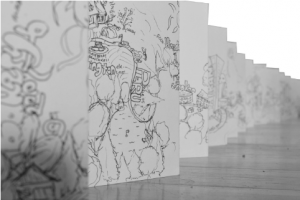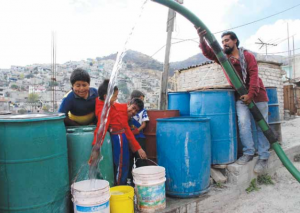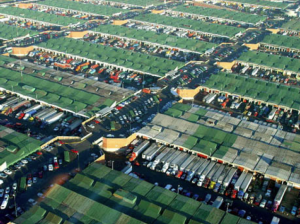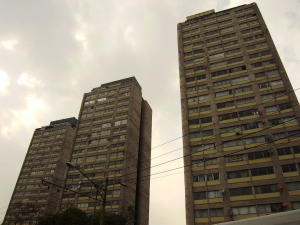2015 Fellows
EN BICI
Hyperlocalized explorations of biking as a tool for urban resilience in Mexico City
Carlos Hernandez-Tellez | Michael Meo
Our research is motivated by the notion of the bicycle as a tool of urban resilience in Mexico City, a metropolis plagued by traffic congestion. We seek to explore, discover, and document the way in which the bicycle defines and transforms one’s perception of the city. Through the lens of Everyday Urbanism, and by embracing the role of the researcher as immersed in everyday life as opposed to removed from it, we will join and study people’s bipedal journeys through the urban landscape.

Panoramic Portrait of Journey Across the United States by Bicycle, Michael Meo 2012
INVISIBLE INFRASTRUCTURE
Mapping the temporal water distribution network of Pipas in el Distrito Federal
Jesica Bello | William Rosenthal
Topographic, political, economic and resource constraints have created uniquely challenging conditions in Mexico City’s water distribution system. The city’s mountainous terrain, drastic seasons, limited budgets and complex politics contributed to the development of an innovative water delivery technology, the water delivery truck or what is colloquially called, a ‘Pipa’. While there are many potential problems with water delivery through non-systematized methods, Pipas have more flexibility than ‘in-ground’ solutions, which has helped the city relieve both acute and chronic water shortages for some districts. While this important infrastructure is not formally part of the water distribution system, people’s dependency on the pipas deliveries has forced it to become formalized in certain areas of Mexico City. This project will map the political and social considerations of this water delivery system while also using gps to map delivery trucks themselves. What is the range of their distribution network? How does this new water delivery system affect people’s daily lives? Who is served by this system and how often? We will focus on a single delegation in Mexico city to begin to answer these questions.

Fuente: http://aapaunam.mx/Revista/Rev-A6-Vol-6-Octubre-Diciembre/Problematica-en-la-distribucion-del-agua-potable-DF-Oct-Dic-2014.pdf
NESTED INFORMALITIES
Central de Abasto and it’s Network of Informal Markets
Resilience of cities depends on flexible and rich layers of infrastructure. Food infrastructure’s resilience faces major challenges from rapidly growing urban consumption centers. As Mexico City’s biggest and last experiment on central economic infrastructure planning, Central de Abasto handles 80% of the food consumption of the Mexico City metropolitan area. We propose to study resilience of Mexico City’s food distribution system through researching Central de Abasto and its Network of Informal Markets. The research on infrastructural resiliency centers around 3 levels of common conflicts: the conflict between urban core’s surging consumption needs and alienation of supply nodes from city core to the vast hinterland; the conflict between bottom-up informal market tradition and centralized, efficiency-oriented planning; the conflict between localized food supply and industrial scale food chain.

Central de Abasto Market, Image courtesy of Oscar Ruiz
HOUSING RESILIENCE:
The Life Cycle of Social Housing in Mexico City
Irene Figueroa Ortiz | Margaret Scott
Housing Resilience captures and categorizes the strategies of incremental modification that have taken place in social housing developments across Mexico City since their construction in the 1960s and 1970s. The investigation serves not only as a visualization of the diversity of social housing typologies and their eventual adaptations, but also as a platform for housing advocates and policymakers to better understand how specific housing adaptations may serve to mitigate housing deterioration or even to prevent housing abandonment.





